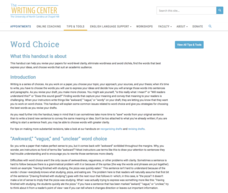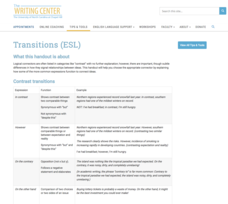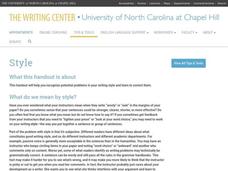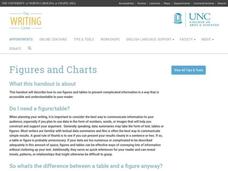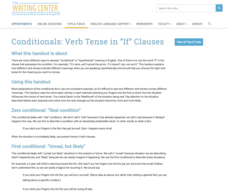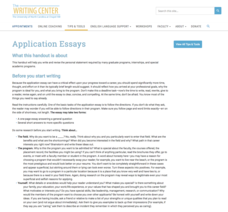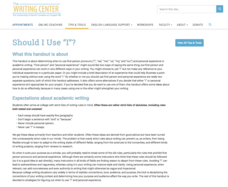University of North Carolina
Word Choice
Words matter, particularly in academic writing. Issues such as vague language, wordiness, and cliches make it difficult to get a point across. Part of a larger series to improve writing skills, the handout on word choice shows writers...
University of North Carolina
Transitions (ESL)
When it comes to comparing and contrasting in an essay, looking at a chart and picking a random transition word may not do the trick. As explained in an informational writing handout, the words writers use to move from one idea to...
Goodwill Community Foundation, Inc.
Directions and Distances
Describe where you are—and find out where you are going—with a beginning Spanish resource on directions and maps. Spanish learners repeat and practice direction words such as norte, este, and oeste, as well as measurement terms such as...
University of North Carolina
Clichés
When it comes to writing, cliches are as old as dirt. A handout on tired phrases provides examples of cliches, as well as a description of the negative effects they have on a paper. Writers discover specific words and phrases to avoid,...
University of North Carolina
Modals
If you could have any job in the world, what would it be? Modal verbs such as could and would express possibility, as the installment of a compilation of informational handouts describes. A series of tables help explain the strength,...
University of North Carolina
Sciences
Science writing follows many of the same principles as writing in language arts, but some structural details differ. Individuals read an online science handout that covers how to write with precision, choose appropriate details, and use...
University of North Carolina
Qualifiers
A lot of writers really struggle very much with adding a lot of qualifiers and intensifiers in their writing. Part of a larger series to improve writing skills, a handout on the topic provides tips to help reduce a reliance on these...
Goodwill Community Foundation, Inc.
Helpful Phrases
Learning Spanish in the classroom is a lot different than using the language in a Spanish-speaking country! Beginning Spanish learners learn how to ask whether someone speaks English, if their conversation partner can repeat him or...
University of North Carolina
Style
Just like you choose your clothes to ensure they fit the occasion, you should choose your words deliberately while writing. Style, the main topic of one handout in a series on writing skills, involves choosing words carefully and paying...
University of North Carolina
Figures and Charts
Sometimes words aren't the best way to get information across to the reader. The eighth handout in the 24-part Writing the Paper series describes different type of figures and charts to display complex information in a paper....
University of North Carolina
Poetry Explications
Explication may sound like a fancy word, but it's just a fancy way to say analysis. Using a handout on poetry explications, part of a larger series on specific writing assignments, writers learn how to break down and analyze a poem. The...
University of North Carolina
Conciseness
Twitter has helped people learn to express their ideas in as few words as possible, but away from the 280-character limit, writers still struggle with keeping their writing short and to the point. Conciseness is the focus of a writing...
University of North Carolina
Articles
English might be a tough language to learn, but at least all words have a specific purpose! A handout from The Writing Center at UNC outlines the purposes of articles in the English language. Discover which types of nouns need articles...
University of North Carolina
Conclusions
If you see phrases such as in conclusion or this is my paper about, you know you're about to read a poorly worded conclusion. A tip sheet, the fifth resource in a series of handouts to improve writing, helps scholars craft better...
Judicial Learning Center
Law and the Rule of Law
We hear a lot about the importance of the rule of law, but most people do not really know what those words mean. The lesson is a webpage that defines the rule of law, explains why it is important in a democratic society and provides...
ProCon
Should Recreational Marijuana Be Legal?
Almost 600,000 Americans are arrested each year for marijuana possession. Pupils decide if marijuana should be legalized for recreational use after reading state-by-state laws and the top pro and con arguments. The resource also includes...
University of North Carolina
Conditionals: Verb Tense in “If” Clauses
"If you give a mouse a cookie, then he's going to ask for a glass of milk." These iconic words from Laura Numeroff's classic tale offer a great example of conditionals, a topic covered in the handout as part of a larger writing series...
University of North Carolina
Application Essays
There's a lot riding on good writing! Often, an application essay is the difference between acceptance and rejection. As part of a series on specific writing assignments and contexts, a handout helps scholars craft the perfect personal...
University of North Carolina
Relative Clauses
Knock, knock. Who's there? To. To who? No! To whom. Knowing when to use who versus whom is just one of the many topics covered on a handout about relative pronouns. Writers discover how to incorporate words such as whose, that, which,...
Goodwill Community Foundation, Inc.
Transportation
Are you going on a trip? ¿Cómo estás viajando? Whether Spanish learners are taking el avión, el autobus, or el tren, they'll know how to describe and pronounce their modes of transportation with an interactive Spanish resource.
Goodwill Community Foundation, Inc.
Meeting New People
Find out your conversation partner's name, job, place of origin, and current residence with a straightforward Spanish practice guide. Learners click on audio icons to hear the proper pronunciation of ¿Como te llamas? and ¿De...
Goodwill Community Foundation, Inc.
Saying Hello: Common Greetings in Spanish
The first thing Spanish learners need to know is how to say hello! An interactive resource guides beginners into basic Spanish greetings with audio prompts and self-assessment checklists.
University of North Carolina
Essay Exams
For decades, the sight of blue books has struck fear in the hearts of collegians. Those books usually signal an essay exam, the topic of one of the handouts in a larger series on specific writing assignments. Using the handout, writers...
University of North Carolina
Should I Use “I”?
Despite the formal nature of academic writing, personal pronouns frequently appear in high school and college papers. While your first instinct may be to cross them out, sometimes it's okay to use them, an idea covered in a handout that...
Other popular searches
- Sight Words
- Root Words
- Compound Words
- Word Games
- Possessives
- Word Families
- Multiple Meaning Words
- Word Problems
- Microsoft Word
- Possessive Nouns Worksheets
- Descriptive Words
- Activities Word Draw Rise
